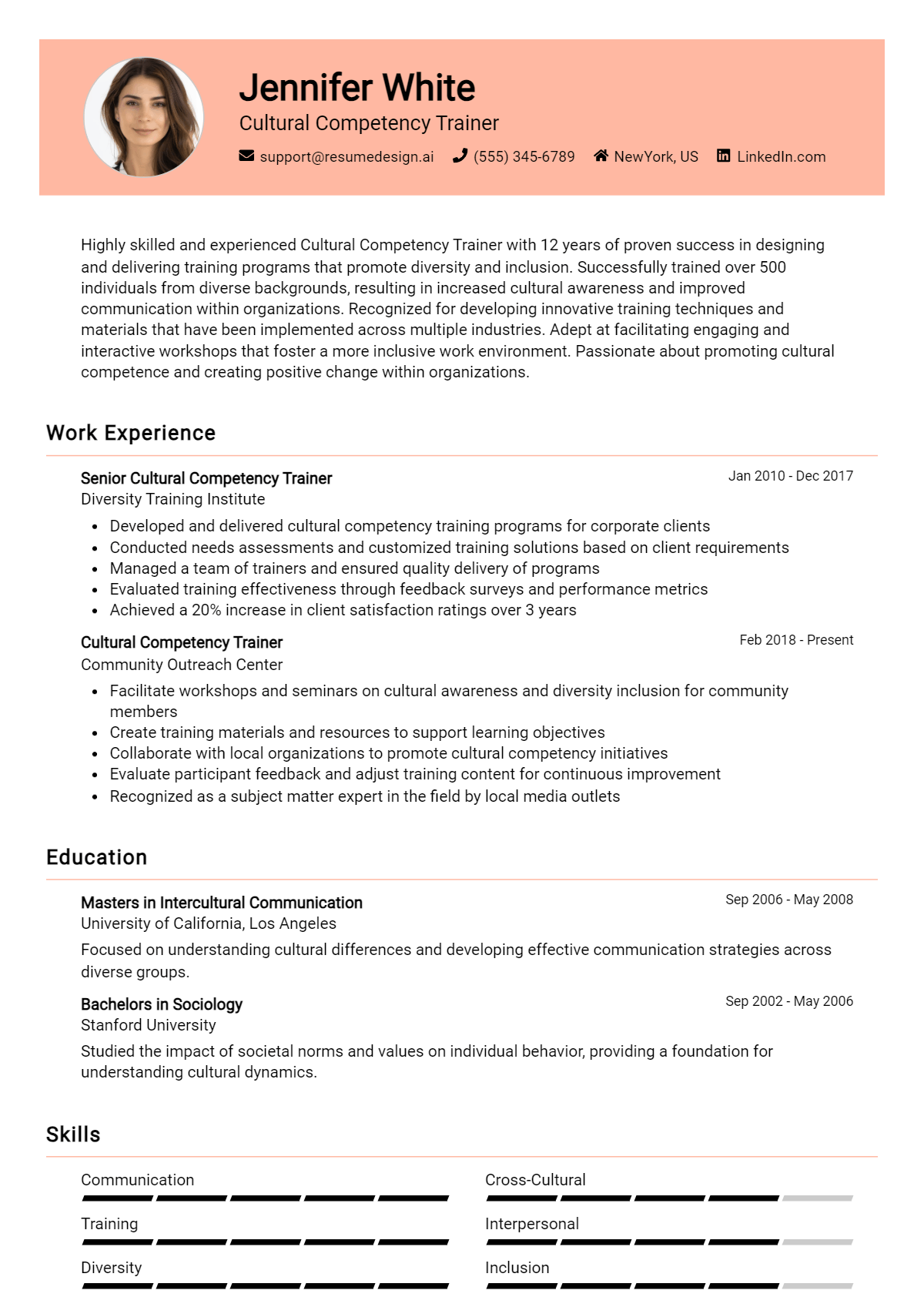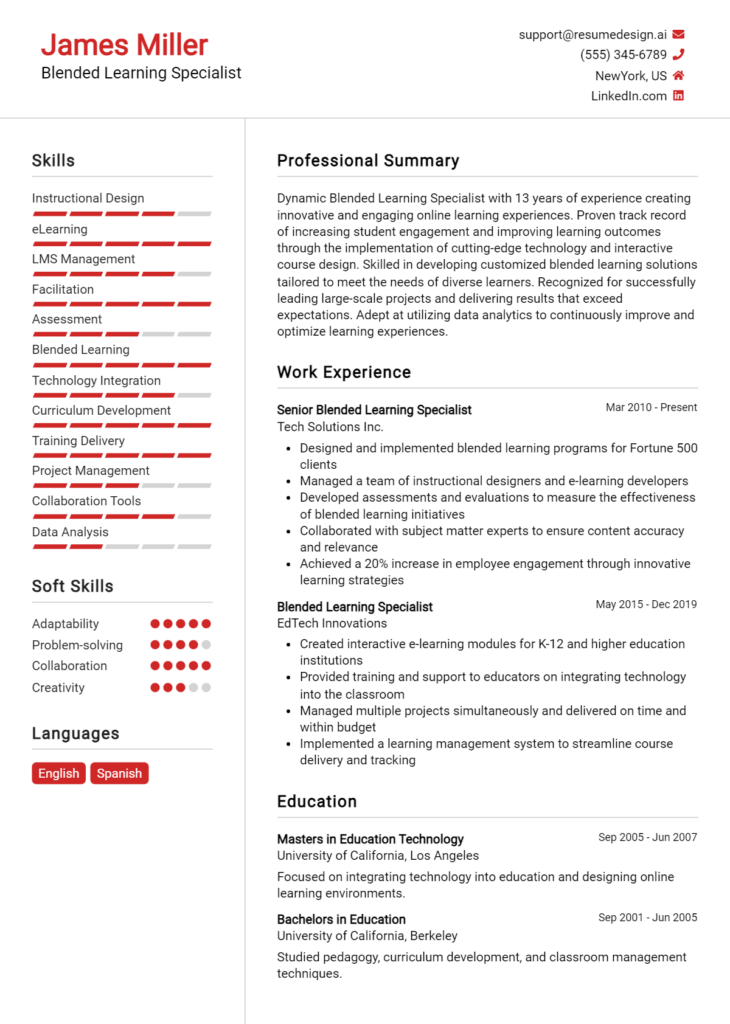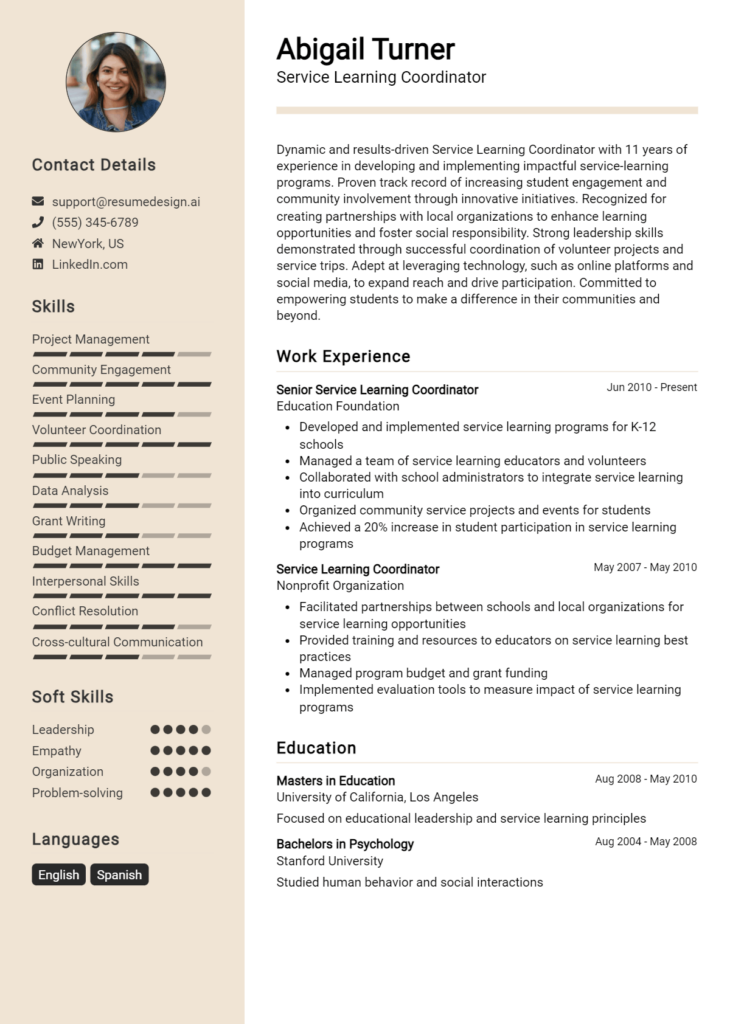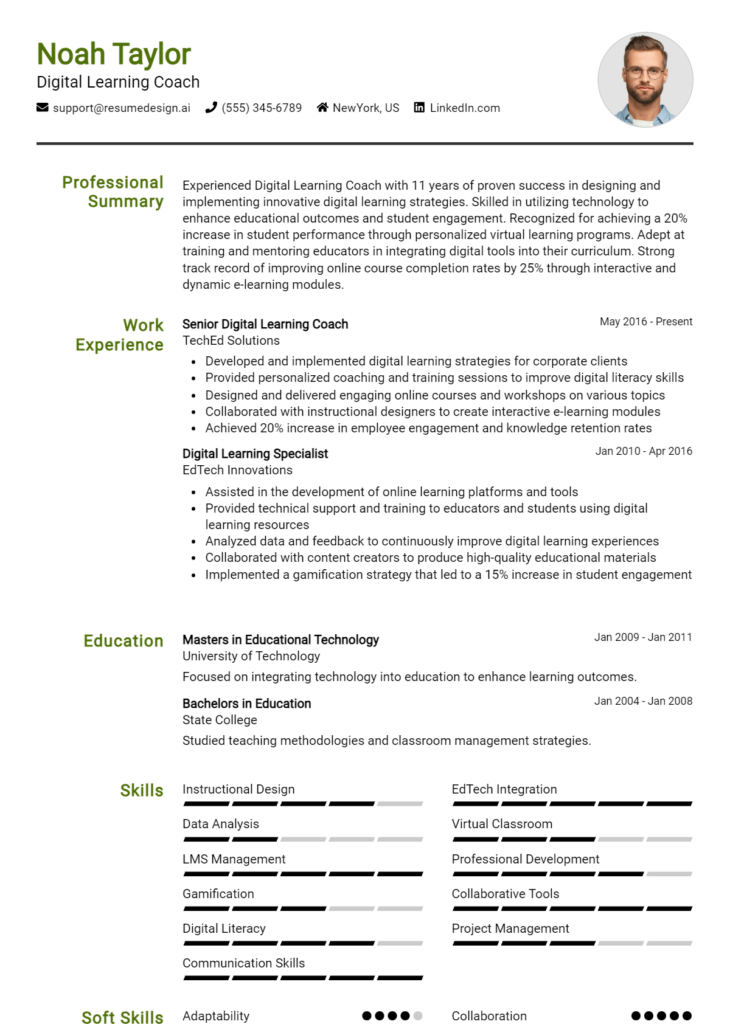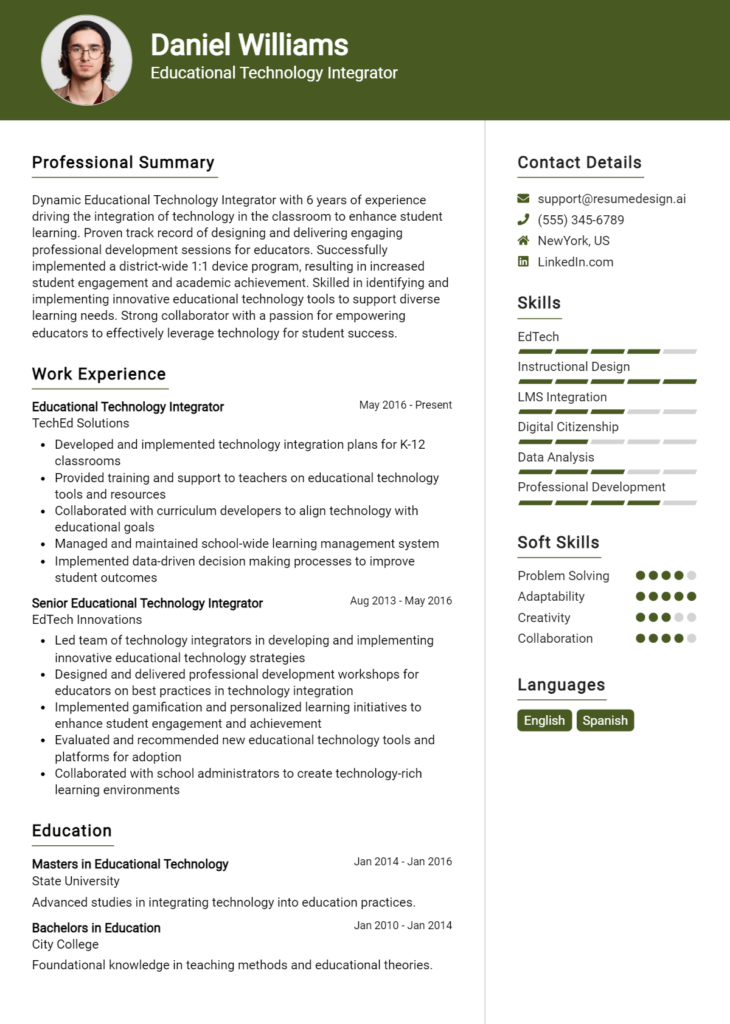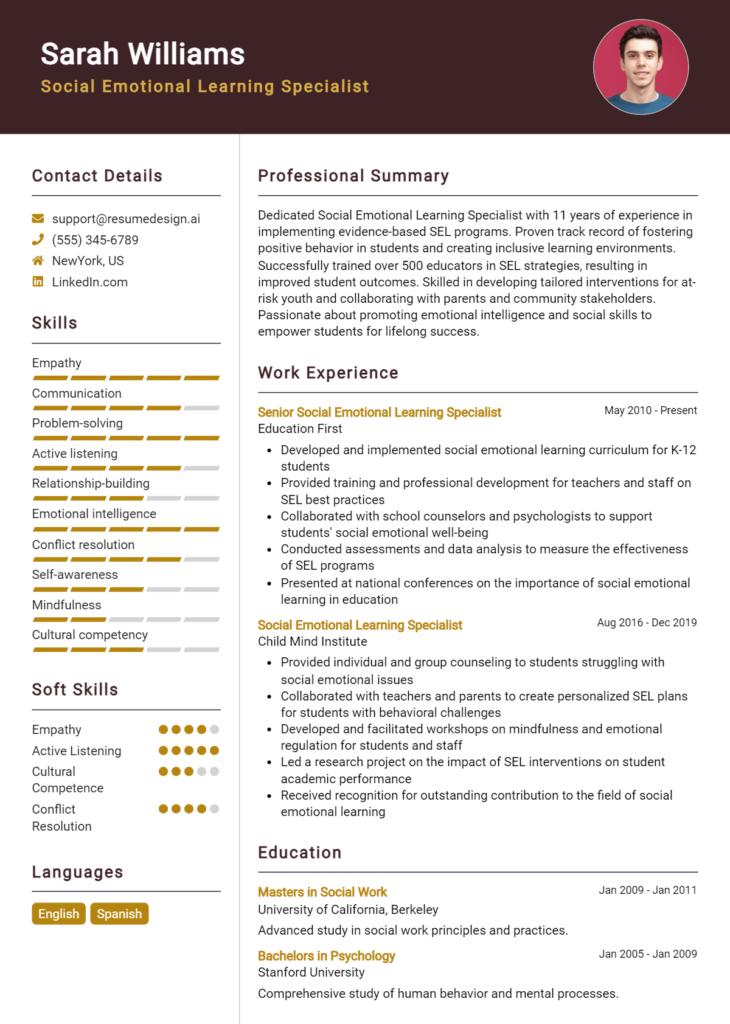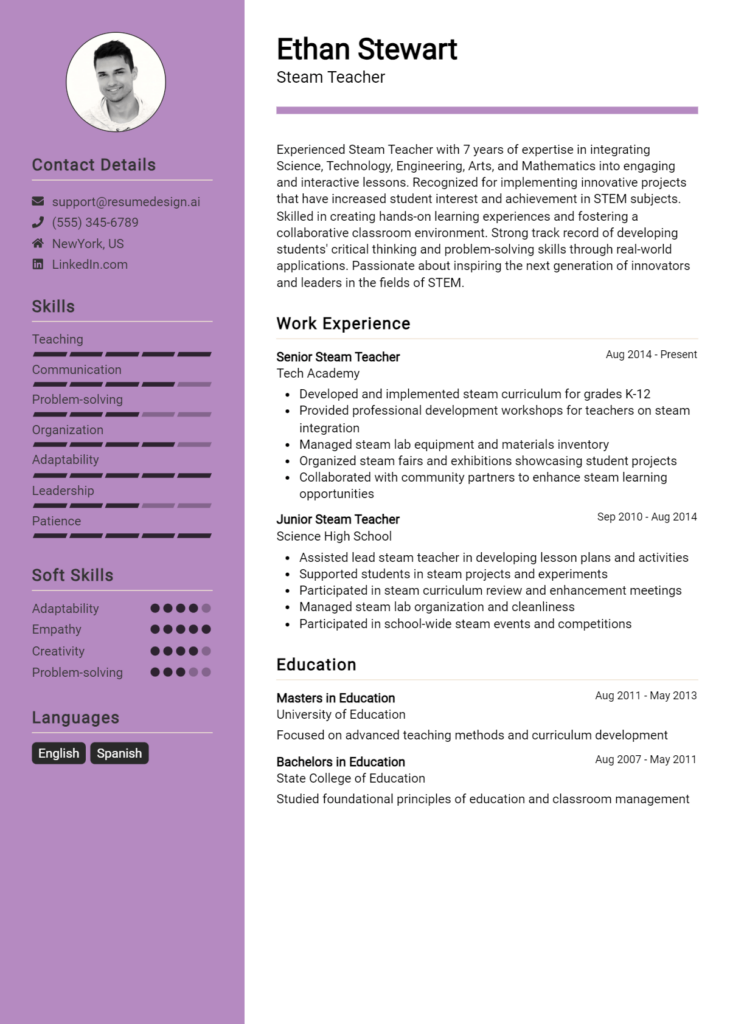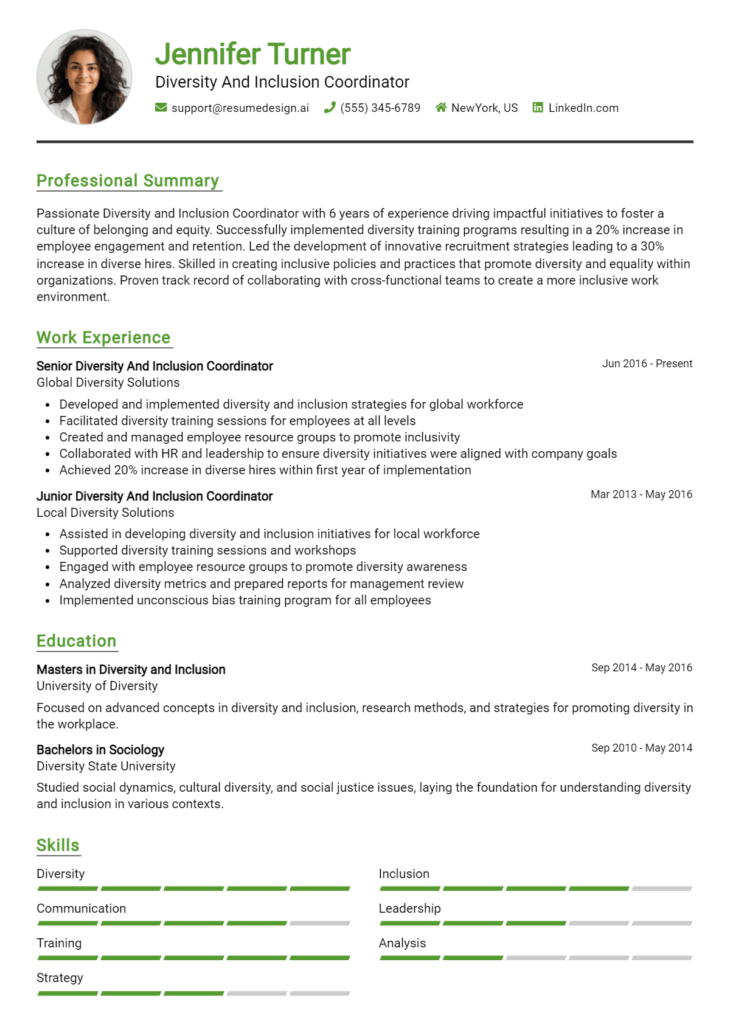Cultural Competency Trainer Core Responsibilities
A Cultural Competency Trainer plays a crucial role in fostering inclusive environments by bridging various departments and functions within an organization. Key responsibilities include designing and delivering training programs, assessing organizational needs, and providing ongoing support to enhance cultural awareness. Essential skills encompass technical proficiency in training methodologies, operational understanding of organizational dynamics, and strong problem-solving abilities. These competencies are vital in achieving the organization's diversity and inclusion goals, and a well-structured resume can effectively highlight these qualifications to prospective employers.
Common Responsibilities Listed on Cultural Competency Trainer Resume
- Develop and implement cultural competency training programs.
- Conduct assessments to identify training needs within the organization.
- Facilitate workshops and seminars on diversity and inclusion.
- Provide resources and support to employees for enhancing cultural awareness.
- Evaluate the effectiveness of training initiatives and make improvements.
- Collaborate with department leaders to integrate cultural competency into policies.
- Stay updated on best practices and emerging trends in cultural competency.
- Measure and report on the impact of training programs.
- Foster a safe and inclusive learning environment for all participants.
- Serve as a resource for conflict resolution related to cultural misunderstandings.
- Advocate for diversity initiatives at all levels of the organization.
High-Level Resume Tips for Cultural Competency Trainer Professionals
In today's diverse and interconnected world, Cultural Competency Trainers play a crucial role in fostering understanding and collaboration among individuals from varied backgrounds. A well-crafted resume serves as a candidate's first impression on potential employers, making it imperative to highlight both skills and achievements effectively. It is not merely a document listing past experiences; it is a strategic marketing tool that showcases one's ability to contribute to an organization's cultural awareness and inclusivity. This guide will provide practical and actionable resume tips specifically tailored for Cultural Competency Trainer professionals, ensuring your resume stands out in a competitive job market.
Top Resume Tips for Cultural Competency Trainer Professionals
- Tailor your resume to match the job description, using keywords that align with the specific requirements of the position.
- Highlight relevant experience in cultural training, diversity initiatives, or related fields to demonstrate your expertise.
- Quantify your achievements by including metrics, such as the number of training sessions conducted or improvements in employee engagement scores.
- Showcase industry-specific skills, such as knowledge of cultural frameworks, conflict resolution techniques, and facilitation abilities.
- Incorporate testimonials or endorsements from previous employers or participants in your training programs to add credibility.
- Utilize a clean and professional format, ensuring your resume is easy to read and visually appealing.
- Include any relevant certifications, such as diversity and inclusion training or intercultural communication certifications, to enhance your qualifications.
- Demonstrate your commitment to ongoing learning in the field by mentioning workshops or courses you’ve attended related to cultural competency.
- Keep your resume concise, ideally one page, while still capturing the depth of your experience and skills.
- Use action verbs to describe your experiences, showcasing your proactive role in fostering cultural competency.
By implementing these tips, you can create a compelling resume that effectively showcases your qualifications and experiences, significantly increasing your chances of landing a job in the Cultural Competency Trainer field. A nuanced and well-structured resume will not only attract the attention of hiring managers but also set the stage for successful interviews, ultimately helping you to secure a role that aligns with your passion for promoting cultural awareness and inclusivity.
Why Resume Headlines & Titles are Important for Cultural Competency Trainer
In the competitive field of Cultural Competency Training, a well-crafted resume headline or title can serve as a critical first impression. It functions as a concise summary that encapsulates a candidate's key qualifications and expertise, instantly grabbing the attention of hiring managers. A strong headline should be relevant to the specific job being applied for, allowing potential employers to quickly assess the candidate’s fit for the role. By highlighting essential skills or accomplishments, an impactful headline can significantly enhance the overall effectiveness of a resume, making it stand out in a crowded applicant pool.
Best Practices for Crafting Resume Headlines for Cultural Competency Trainer
- Keep it concise: Aim for a headline that is no longer than 10-12 words.
- Be role-specific: Use keywords that directly relate to the Cultural Competency Trainer position.
- Highlight key strengths: Focus on unique skills or experiences that set you apart.
- Use action-oriented language: Employ strong verbs to convey your capabilities.
- Tailor to the job description: Align your headline with the specific requirements of the position.
- Incorporate measurable achievements: If possible, mention quantifiable results that demonstrate your impact.
- Avoid clichés: Steer clear of overused phrases that do not add value.
- Make it engaging: Create a headline that piques curiosity and encourages further reading.
Example Resume Headlines for Cultural Competency Trainer
Strong Resume Headlines
Cultural Competency Trainer with 10+ Years of Transformative Learning Experience
Expert in Diversity Training & Inclusive Curriculum Development
Results-Driven Cultural Competency Specialist Focused on Behavioral Change
Dynamic Facilitator Skilled in Cross-Cultural Communication and Engagement
Weak Resume Headlines
Experienced Trainer
Cultural Competency Professional
Strong headlines are effective because they are specific, relevant, and action-oriented, clearly communicating the candidate's value proposition to hiring managers. They highlight unique qualifications and experiences, making a memorable impact. In contrast, weak headlines fail to impress as they are vague and generic, lacking the detail and specificity that would engage potential employers. These lack of distinctive elements can make the candidate appear less qualified or forgettable in a sea of applicants.
Writing an Exceptional Cultural Competency Trainer Resume Summary
A well-crafted resume summary is crucial for a Cultural Competency Trainer as it serves as an initial snapshot of the candidate's qualifications, setting the tone for the entire resume. A strong summary quickly captures the attention of hiring managers by effectively showcasing key skills, relevant experience, and notable accomplishments that align with the job role. This concise yet impactful section should be tailored specifically to the position being applied for, ensuring that it resonates with the employer's needs and expectations.
Best Practices for Writing a Cultural Competency Trainer Resume Summary
- Quantify Achievements: Use numbers and data to illustrate the impact of your work in previous roles.
- Focus on Relevant Skills: Highlight skills that are directly related to cultural competency training, such as communication, facilitation, and conflict resolution.
- Tailor to the Job Description: Customize your summary to reflect the specific requirements and language found in the job posting.
- Be Concise: Keep your summary brief, ideally between 3-5 sentences, to maintain the reader's attention.
- Showcase Key Accomplishments: Mention specific projects or initiatives that demonstrate your effectiveness and expertise.
- Use Action-Oriented Language: Start sentences with powerful verbs to convey confidence and assertiveness.
- Highlight Diversity Experience: Include any relevant experience working with diverse populations or organizations committed to diversity and inclusion.
- Maintain Professional Tone: Ensure that your language is professional and aligns with the expectations of the hiring organization.
Example Cultural Competency Trainer Resume Summaries
Strong Resume Summaries
Dynamic Cultural Competency Trainer with over 8 years of experience in developing and implementing training programs that resulted in a 30% increase in employee engagement in diverse teams. Skilled in facilitating workshops and creating tailored content to enhance understanding of cultural diversity.
Results-driven Cultural Competency Trainer who successfully led a team to deliver over 50 training sessions, achieving a 90% satisfaction rate among participants. Proven ability to cultivate an inclusive environment and promote awareness of cultural differences within organizations.
Experienced Cultural Competency Trainer with a track record of enhancing organizational effectiveness through targeted training initiatives. Increased cultural awareness scores by 40% within one year through strategic workshops and feedback mechanisms.
Weak Resume Summaries
Cultural Competency Trainer with experience in conducting training sessions and working with diverse groups.
I am a skilled trainer who focuses on cultural issues and has helped some organizations improve their diversity programs.
The strong resume summaries are considered effective due to their specificity, quantifiable outcomes, and clear relevance to the role of a Cultural Competency Trainer. Each example emphasizes measurable results and specific skills that demonstrate the candidate's impact. In contrast, the weak summaries lack detail, are overly general, and do not convey the candidate's unique qualifications or achievements, making them less compelling to hiring managers.
Work Experience Section for Cultural Competency Trainer Resume
The work experience section of a Cultural Competency Trainer resume is essential as it serves as a testament to the candidate's technical skills, ability to manage diverse teams, and effectiveness in delivering high-quality training programs. This section not only highlights the candidate's past roles and responsibilities but also emphasizes their achievements in quantifiable terms. Aligning the experience with industry standards showcases the candidate's understanding of cultural competency frameworks and their application in real-world scenarios, which is crucial for potential employers looking for proven expertise in this field.
Best Practices for Cultural Competency Trainer Work Experience
- Focus on quantifiable results: Use metrics to demonstrate the impact of your training programs.
- Highlight technical expertise: Specify tools, methodologies, or frameworks utilized in training sessions.
- Showcase collaboration: Describe experiences working with diverse teams and stakeholders.
- Align experiences with industry standards: Use terminology and frameworks recognized in cultural competency.
- Emphasize leadership roles: Detail any experience in leading training initiatives or workshops.
- Include feedback and evaluation outcomes: Incorporate metrics from participant feedback to show effectiveness.
- Utilize action verbs: Start bullet points with strong action verbs to convey initiative and impact.
- Keep it relevant: Tailor the work experience to reflect the requirements of the position you are applying for.
Example Work Experiences for Cultural Competency Trainer
Strong Experiences
- Developed and facilitated a series of workshops that improved team collaboration by 30%, as measured by post-training surveys.
- Led a cross-cultural training program for 150 employees, resulting in a 25% increase in cultural awareness scores across the organization.
- Implemented a mentorship initiative that paired 50 new hires with culturally diverse mentors, enhancing retention rates by 15% within the first year.
- Designed a comprehensive curriculum on unconscious bias that was adopted by three departments, leading to a 40% reduction in reported incidents of bias-related issues.
Weak Experiences
- Conducted various training sessions on diversity and inclusion.
- Worked with teams to promote cultural understanding.
- Assisted in developing training materials for workshops.
- Participated in discussions about cultural competency within the organization.
The examples of strong experiences are considered effective because they utilize quantifiable outcomes, demonstrate technical leadership, and highlight successful collaboration, providing clear evidence of the candidate’s impact in the field. In contrast, the weak experiences lack specific details, measurable results, and action-oriented language, making them less compelling and impactful for potential employers. Strong experiences paint a picture of a proactive and results-driven trainer, while weak experiences come across as vague and unimpressive.
Education and Certifications Section for Cultural Competency Trainer Resume
The education and certifications section of a Cultural Competency Trainer resume is pivotal in showcasing the candidate's academic achievements, relevant certifications, and commitment to continuous professional development. This section not only emphasizes the candidate's foundational knowledge and skills but also illustrates their dedication to staying current in a field that is ever-evolving. Providing details about pertinent coursework, specialized training programs, and industry-recognized certifications can significantly enhance the candidate's credibility, making them a more compelling fit for the role. It communicates to potential employers that the candidate possesses the necessary expertise to effectively foster diversity and inclusion within organizations.
Best Practices for Cultural Competency Trainer Education and Certifications
- Prioritize relevant academic degrees related to social sciences, education, or diversity studies.
- Include recognized certifications, such as Certified Diversity Professional (CDP) or Diversity and Inclusion Certificate.
- List specialized training programs that focus on cultural awareness, bias training, or intercultural communication.
- Detail relevant coursework that aligns with cultural competency and diversity training.
- Highlight any advanced degrees, such as a Master’s in Organizational Psychology or a related field.
- Keep descriptions concise while ensuring they are informative and relevant to the role.
- Showcase any affiliations with professional organizations dedicated to diversity and inclusion.
- Regularly update the section to reflect ongoing education and new certifications.
Example Education and Certifications for Cultural Competency Trainer
Strong Examples
- M.A. in Cultural Studies, University of Diversity, 2021
- Certified Diversity Professional (CDP), National Diversity Council, 2022
- Advanced Certificate in Intercultural Communication, Global Institute for Cultural Competence, 2020
- Coursework in Multicultural Education and Social Justice, University of Inclusion, 2019
Weak Examples
- B.A. in Business Administration, University of Commerce, 2010
- Certification in Basic First Aid, Red Cross, 2018
- Ph.D. in Historical Studies, University of History, 2015
- Online Course in Time Management, Coursera, 2021
The strong examples are considered effective because they directly align with the skills and knowledge necessary for a Cultural Competency Trainer, showcasing relevant degrees and certifications that reflect a commitment to diversity and inclusion. In contrast, the weak examples are less relevant to the role, as they focus on unrelated fields or skills that do not contribute to the candidate's ability to facilitate cultural competency training.
Top Skills & Keywords for Cultural Competency Trainer Resume
As a Cultural Competency Trainer, showcasing the right skills on your resume is crucial for demonstrating your capability to foster understanding and appreciation for diverse cultures within organizations. The blend of hard and soft skills is vital not only for teaching and facilitating training sessions but also for building rapport with participants from various backgrounds. Employers seek candidates who possess a well-rounded skill set that reflects their ability to engage, educate, and encourage inclusivity. Highlighting these skills effectively can set you apart in a competitive job market and align your qualifications with the expectations of potential employers. For more insights on how to enhance your resume, consider exploring relevant skills and work experience sections.
Top Hard & Soft Skills for Cultural Competency Trainer
Soft Skills
- Empathy
- Active Listening
- Communication Skills
- Adaptability
- Conflict Resolution
- Facilitation Skills
- Relationship Building
- Cultural Awareness
- Open-Mindedness
- Critical Thinking
- Emotional Intelligence
- Team Collaboration
- Patience
- Public Speaking
- Motivational Skills
Hard Skills
- Curriculum Development
- Training Program Design
- Diversity and Inclusion Strategies
- Assessment and Evaluation Techniques
- Knowledge of Cultural Theories
- Workshop Facilitation
- Data Analysis for Training Impact
- Policy Analysis
- Research Skills
- Multilingual Proficiency
- E-learning Tools Proficiency
- Microsoft Office Suite
- Social Media Engagement
- Project Management
- Compliance and Regulatory Knowledge
- Instructional Design
Stand Out with a Winning Cultural Competency Trainer Cover Letter
Dear [Hiring Manager's Name],
I am writing to express my interest in the Cultural Competency Trainer position at [Company Name], as advertised on [where you found the job listing]. With a robust background in diversity and inclusion initiatives, coupled with my passion for fostering inclusive environments, I am excited about the opportunity to contribute to your organization’s commitment to cultural awareness and sensitivity. My experience in designing and implementing training programs aimed at enhancing cultural competence equips me with the skills necessary to effectively engage and empower teams in understanding and appreciating diverse perspectives.
In my previous role at [Previous Company], I successfully developed a comprehensive training curriculum that addressed various cultural dimensions and their impact on workplace dynamics. This program not only improved team collaboration but also increased employee satisfaction by fostering a more inclusive culture. Utilizing interactive workshops and real-world case studies, I ensured participants could apply their learning in practical scenarios, leading to measurable improvements in team performance. My ability to connect with individuals from diverse backgrounds allows me to create a safe and engaging space for open dialogue, where participants feel valued and heard.
I am particularly drawn to the mission of [Company Name] and its dedication to promoting cultural awareness. I believe that my proactive approach to training and my commitment to ongoing learning in cultural competency will align seamlessly with your organization’s goals. I am eager to bring my expertise in fostering an environment where all employees can thrive, irrespective of their backgrounds. I look forward to the possibility of collaborating with your team to implement effective strategies that enhance cultural understanding and drive organizational success.
Thank you for considering my application. I am excited about the opportunity to discuss how my skills and experiences align with the needs of [Company Name]. I look forward to the possibility of contributing to your team and supporting your mission to cultivate a culturally competent workplace.
Sincerely,
[Your Name]
[Your Contact Information]
Common Mistakes to Avoid in a Cultural Competency Trainer Resume
When crafting a resume for a Cultural Competency Trainer position, it's crucial to present your qualifications and experiences in a way that resonates with potential employers. However, many candidates make common mistakes that can undermine their chances of landing an interview. By avoiding these pitfalls, you can create a compelling resume that highlights your skills and demonstrates your commitment to cultural competence.
Neglecting Tailoring: Failing to customize your resume for the specific job posting can make it seem generic. Tailoring your experience and skills to match the job description shows you’ve done your homework and understand the organization’s needs.
Overlooking Relevant Experience: Cultural competency can be developed through various roles. Omitting relevant volunteer work, community engagement, or informal training experiences can diminish the perception of your qualifications.
Using Jargon without Explanation: While industry-specific terminology can demonstrate expertise, excessive jargon can alienate readers who may not be familiar with it. Always clarify terms and ensure your language is accessible.
Ignoring Measurable Outcomes: Simply listing responsibilities without showcasing achievements can make your impact less clear. Use quantifiable outcomes (e.g., "increased participant satisfaction by 30%") to illustrate your effectiveness.
Inconsistency in Formatting: A cluttered or inconsistent format can distract from your content. Ensure your headings, bullet points, and fonts are uniform to maintain professionalism and readability.
Omitting Soft Skills: Cultural competency requires a blend of hard and soft skills. Failing to highlight critical soft skills, such as empathy, active listening, and adaptability, can leave a gap in your presentation.
Neglecting Professional Development: Not mentioning ongoing education, certifications, or workshops related to cultural competency can suggest a lack of commitment to personal growth in the field. Including this information can enhance your credibility.
Forgetting to Include a Summary Statement: A summary at the top of your resume can provide a snapshot of your qualifications and career goals. Omitting this can make it harder for recruiters to quickly grasp your value proposition.
Conclusion
As we conclude our exploration of the essential qualities and skills necessary for a successful Cultural Competency Trainer, it's important to highlight a few key points. First, a deep understanding of diverse cultures and social dynamics is crucial for fostering inclusive environments. Second, effective communication skills are vital for delivering training sessions that resonate with varied audiences. Additionally, practical experience in organizational settings enhances a trainer's ability to apply theoretical knowledge in real-world scenarios.
Now is the perfect time to reflect on your own qualifications and experiences. Are you presenting your skills effectively in your resume? A well-crafted resume can significantly impact your job search. To aid you in this process, consider utilizing the following resources: explore resume templates to find a layout that suits your style, use the resume builder for a guided approach to creating your document, check out resume examples for inspiration, and don’t forget to enhance your application with a tailored cover letter template.
Take action today! Review your Cultural Competency Trainer resume to ensure it effectively showcases your unique qualifications and readiness for the next step in your career.

